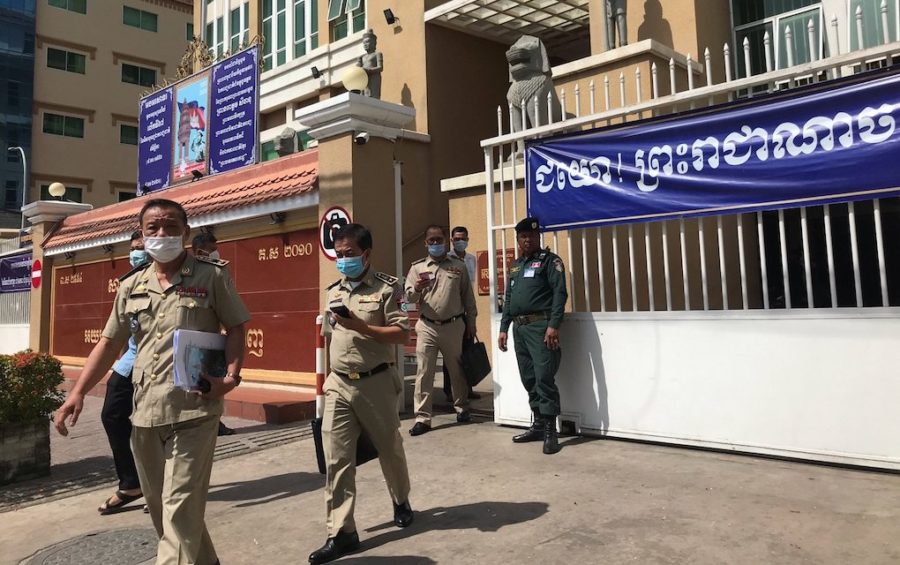Prosecutors on Friday showed statements, recorded speeches and social media posts from senior opposition leaders — including comments made during a meeting in Lowell, Massachusetts in 2019 — as evidence that nine defendants charged with attacking the government had planned a coup.
A defense attorney disputed the charge, however, noting that only four of the nine defendants’ statements were shown as evidence, and their speeches were “just political messages” followed by no action.
In the first trial hearing of nine senior leaders of the outlawed opposition CNRP, after a November hearing was delayed, Phnom Penh Municipal Court Presiding Judge Duch Sok Sarin read out the names of the accused: CNRP co-founder Sam Rainsy, party vice presidents Eng Chhai Eang and Mu Sochua, and former CNRP lawmakers Ou Chanrith, Ho Vann, Long Ry, Men Sothavarin, Nut Romduol and Tioulong Saumura, who is also Rainsy’s wife.
During the more than three-hour hearing, Sim Vuthy, deputy director of the Interior Ministry’s anti-terrorism department, was asked by the judge to show evidence he collected for the case against the nine defendants.
Vuthy told the court that police had searched and cited the content of messages, images, videos, leaflets, audio voice recordings, news interviews and transcriptions from Rainsy’s Facebook page from January, July, August and September 2019. The materials aimed to provoke people and the armed forces to rise up against the government, he said.
Some evidence was also culled from CNRP activist Seng Mengbunrong’s Facebook page.
One piece of evidence was a statement from a September 2019 meeting of top CNRP leaders during which they appointed Rainsy as acting party president, and presented plans for his return from exile, the preparation of funds to support defecting armed forces, and appeals to Cambodians living overseas to return with him to Cambodia, an effort which was never realized.
Vuthy said the materials showed a promise to give money to forces who defected from the government, which he called illegal.
“[They] incited soldiers to rise up against the government. It meant having a coup d’etat. Please prosecutor, follow the legal procedure,” he said.
Defense lawyers then asked Vuthy whether he had seen any actions result from the CNRP appeals. The anti-terrorism police official replied that precautions were needed.
“Inspiring people and forces to rise up against the government is illegal already. We don’t need to talk about any clash,” he said.
Friday’s hearing was part of a series of trials against more than 150 defendants affiliated with the banned CNRP, the country’s main opposition party which was controversially dissolved by the Supreme Court in 2017 following a disputed treason charge against party president Kem Sokha. In the aftermath, dozens of CNRP members fled the country to avoid arrest, while others were jailed in relation to their continued support for the banned party.
On Thursday, the court grilled opposition defendants during a separate ongoing trial of 60 CNRP politicians and supporters in a case related to their alleged support for the leaders’ return attempt.
In court on Friday, deputy prosecutor Seng Heang asked the court to play a more than two-hour video featuring the nine party leaders, including Rainsy, Sochua, Chhai Eang and Chanrith making commitments to return to Cambodia, and appealing to Cambodians inside and outside the country to join the CNRP leaders’ homecoming.
“Now, we can’t wait any more,” Sochua says in the video. “We are the front line because Cambodia belongs to all of us, and not just to Sam Rainsy alone.”
In the same video, Chhai Eang says the decision to return was made after five months of discussions and requests from people.
“Please people, participate together to rescue our country,” he says. “If we have more people participate, Hun Sen can’t make arrests, [we] can’t be shot.” He also says police and military commanders would not support the prime minister’s crackdown.
Chanrith also appeals to people to participate in a historic change on November 9, 2019, the planned date of the CNRP leaders’ return.
Heang, the deputy prosecutor, told the court there was enough evidence to find the accused guilty of the charge of “attack,” especially the claims made by Rainsy.
“This claim ignited people’s anger to get mad at the legitimate government and [encourage] people to topple the government. In a democratic system, any change outside the election process is a coup d’etat,” Heang said.
If convicted, the defendants face prison sentences of 15 to 30 years.
Government lawyer Koun Saroeun echoed Heang, calling the accused’s words incitement and reiterating that they appealed to the armed forces as well as planned to support soldiers who defected.
Defense lawyer Sam Sokong, however, noted that the video evidence showed only four people making statements while the court charged nine.
Sokong said the video shows a meeting, where, generally, statements are made, and it was not an appeal nor illegal. His clients had the right to hold a meeting and express their ideas.
“It is a kind of expression of ideas and plans, but there are no actions,” the defense lawyer said, “Partly, they are, like Sam Rainsy, former leaders and politicians so their messages are just political messages.”
Judge Sok Sarin said the trial will resume on February 9.












